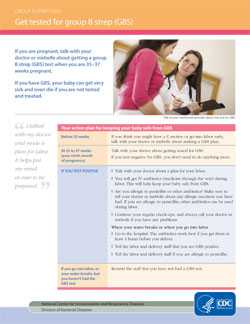Prevent Infections During Pregnancy

If you’re pregnant or planning a pregnancy, there are simple steps you can take to protect your fetus or newborn from infections that cause serious health problems.
Cytomegalovirus (CMV)
A pregnant woman infected with CMV can pass the virus to her baby during pregnancy. Most babies born with CMV infection will be fine and will not have symptoms or develop health problems. However, some babies will have permanent problems, such as hearing or vision loss or intellectual disabilities, at birth, or develop problems later on.
CMV is passed from infected people to others through body fluids, such as saliva, urine, blood, vaginal secretions, and semen. Infants and young children are more likely to shed CMV in their saliva and urine than older children and adults. For pregnant women, the two most common ways they are exposed to CMV is through contact with saliva and urine of children with CMV infection and sexual activity.
Regular hand washing, particularly after changing diapers, is a commonly recommended step to decrease the spread of infections and may reduce exposures to CMV.
More Information on CMV and Pregnant Women
- Get disease details on cytomegalovirus and congenital CMV infection.
- Learn more about congenital CMV infection.

Fact sheet: Get tested for group B strep [446 KB] (Also available in Spanish [480 KB].)
Group B Strep
If you are pregnant—or know anyone who is—you need to know about group B strep. About 1 in 4 women in the United States carry the bacteria that cause group B strep infection. Babies can get very sick and even die if their mothers pass group B strep bacteria to them during childbirth. If you are pregnant, talk to your doctor or midwife about getting tested for group B strep. If you test positive you will get an antibiotic during labor to prevent the bacteria from spreading to your baby. It’s important to get tested for group B strep during each pregnancy.
Remember:
- Talk with your doctor or midwife about getting a group B strep test when you are 35 through 37 weeks pregnant.
- If the test shows that you carry the bacteria, talk with your doctor or midwife about a plan for your labor. Be sure to tell them if you are allergic to penicillin or other antibiotics.
- If you go into labor or your water breaks before you are tested for group B strep, remind the labor and delivery staff that you have not had a group B strep test.
More Information on Group B Strep and Your Pregnancy
- Learn more about preventing group B strep.
- Protect Your Baby from Group B Strep [PODCAST – 6:14 minutes]
- 35-37 weeks pregnant? Ask your health care provider about getting a group B strep test.
- Pregnant or planning a pregnancy? The best way to protect your fetus from cytomegalovirus (CMV) is to protect yourself — especially by washing your hands.
- Pregnant women are about 10 times more likely than other people to get a serious infection called listeriosis, but you can take steps to protect yourself as well as your fetus or newborn.

Pregnant women are about 10 times more likely than other people to get listeriosis.
Listeriosis and Pregnancy
Listeriosis is a rare but serious infection caused by eating food contaminated with bacteria called Listeria. Listeriosis mostly affects pregnant women, newborns, older adults, and people with weakened immune systems. Pregnant women are 10 times more likely than other people to get listeriosis. About 1 in 6 cases of listeriosis are associated with pregnancy.
Pregnant women typically experience only fever and other flu-like symptoms, such as fatigue and muscle aches (see “What are the symptoms of listeriosis?“). However, infections during pregnancy can lead to miscarriage, stillbirth, premature delivery, or life-threatening infection of the newborn.
In general, you can protect yourself from listeriosis by following these guidelines:
- Avoid eating cheese made from raw (unpasteurized) milk.
- Soft cheeses made with pasteurized milk, including commercial cottage cheese, cream cheese, and mozzarella, are generally regarded as safe. However, some soft cheeses made with pasteurized milk, including Hispanic-style soft cheeses, have become contaminated with Listeria during processing. This could occur again.
- Avoid raw (unpasteurized) milk.
- Do not eat raw or lightly cooked sprouts of any kind (including alfalfa, clover, radish, and mung bean sprouts).
- Eat cut melon right away or refrigerate it at 40° F or colder and for no more than 7 days. Throw away cut melons left at room temperature for more than 4 hours.
- Avoid eating hot dogs, lunch meats, cold cuts, other deli meats (such as bologna), or fermented or dry sausages unless they are heated to an internal temperature of 165°F or until steaming hot just before serving. Don’t let juice from hot dog and lunch meat packages get on other foods, utensils, and food preparation surfaces. Wash hands after handling hot dogs, lunch meats, and deli meats.
- Do not eat refrigerated pâté or meat spreads from a deli or meat counter or from the refrigerated section of a store. Foods that do not need refrigeration, like canned or shelf-stable pâté and meat spreads, are safe to eat. Refrigerate these foods after opening.
- Do not eat refrigerated smoked seafood unless it is in a cooked dish, such as a casserole, or unless it is canned or shelf-stable.
If you are pregnant and Hispanic, your risk of getting listeriosis is even greater. Pregnant Hispanic women are about 24 times more likely than other people to get listeriosis. Be aware that some Hispanic-style cheeses, such as queso fresco, that were made from pasteurized milk but were contaminated when the cheese was being made, have also caused Listeria infections. Hispanic-style soft cheeses include queso fresco, queso blanco, queso blando, queso Cotija, queso panela, queso ranchero, cuajada en terrón, and others. Learn about additional ways to reduce your risk for listeriosis.
If you are pregnant and have a fever and other symptoms of possible listeriosis, such as fatigue and muscle aches, within two months after eating a possibly contaminated food, you should seek medical care and tell the doctor about eating possibly contaminated food. If you are infected, your health care provider can give you antibiotics that can protect your fetus or newborn. If you ate food possibly contaminated with Listeria and do not feel sick, most experts believe you do not need tests or treatment, even if you are in a group that is more likely to get listeriosis.
More Information on Listeriosis and Foods to Avoid During Pregnancy
- Recipe for Food Safety: Protecting people from deadly Listeria food poisoning
- Fotonovela: While pregnant, be careful with queso fresco [2.9 MB, 3 pages] (Spanish [2.9 MB, 3 pages])
- Infographic: Check the cheese, avoid Listeria [2.0 MB, 1 page] (Spanish [2.1 MB, 1 page])
- Fact Sheet: While pregnant, be careful with queso fresco [145 KB, 1 page] (Spanish [136 KB, 1 page])
- CDC website: Listeria (Spanish)
- Foodsafety.gov checklist: Foods to avoid during pregnancy
- Information from USDA: Protect your baby and yourself from listeriosis
- Information from FDA: Listeriosis in Pregnant Hispanic Women in the U.S.
Zika and Pregnancy
Zika virus can be passed from a pregnant woman to her developing baby during pregnancy or around the time of birth. Zika virus infection during pregnancy is a cause of microcephaly and has been linked to other pregnancy problems and serious birth defects, including miscarriage, stillbirth, eye defects, hearing loss, and impaired growth. Zika is primarily spread through the bite of an infected Aedes aegypti or Aedes albopictus mosquito. However, Zika can also be spread during sex by a person infected with Zika to his or her sex partners.
CDC has issued a travel notice (Level 2-Practice Enhanced Precautions) for people traveling to places where Zika virus is spreading. Specific areas where Zika is spreading are often difficult to determine and are likely to change over time. As more information becomes available, CDC’s Zika travel notices will be updated. Please check CDC’s Zika Travel Information website frequently for the most up-to-date travel recommendations.
Pregnant women
- Should not travel to areas with Zika.
- Who must travel to one of these areas should talk to their doctor or healthcare provider first and strictly follow steps to prevent mosquito bites during the trip.
- Should talk with their doctor and consider postponing nonessential travel to countries in CDC’s special travel considerations.
- Who have a sex partner who lives in or has traveled to an area with Zika should protect themselves by using condoms correctly, from start to finish, every time they have sex, or they should not have sex during the pregnancy. This includes vaginal, anal, oral sex, and the sharing of sex toys.
Women trying to become pregnant
- Should consider avoiding nonessential travel to areas with Zika.
- Who must travel to one of these areas should consult with their healthcare provider first before traveling to areas with Zika, and they and their partners should strictly follow steps to prevent mosquito bites during the trip.
- Who have a sex partner who lives in or has traveled to an area with Zika should protect themselves from getting Zika during sex.
- Should review CDC’s guidance for men and women who are thinking about pregnancy in the context of the Zika outbreak.
Partners of pregnant women who live in or have traveled to an area with Zika
- Should take steps to prevent mosquito bites.
- Should use a condom correctly, from start to finish, every time they have sex, or not have sex during the pregnancy. This includes vaginal, anal, and oral sex and the sharing of sex toys. Condoms include male or female condoms. Not having sex is the only way to be sure that Zika will not spread through sex.
- Should talk to a healthcare provider about how to prevent sexual transmission of Zika during pregnancy and reduce the risk of birth defects related to Zika.
For more information, visit our Zika and Pregnancy webpage.
- Page last reviewed: June 5, 2017
- Page last updated: June 5, 2017
- Content source:
- National Center for Immunizations and Respiratory Diseases
- Page maintained by: Office of the Associate Director for Communication, Digital Media Branch, Division of Public Affairs




 ShareCompartir
ShareCompartir